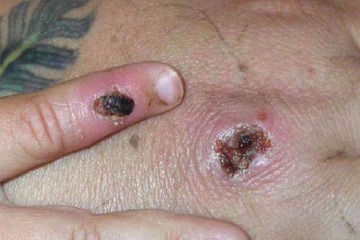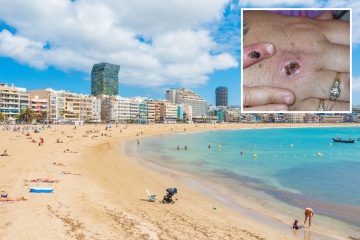
A WORLD health leader has said sex occuring at two raves in Europe could be behind the mystery monkeypox outbreaks.
Monkeypox is not known as a sexually transmitted infection (STI), but it can be passed on by direct contact during sex.
GettySex at festivals and raves could help spread monkeypox, experts say[/caption]
Health officials have said a notable proportion of the cases in Britain and Europe have been in young men who are gay, bisexual or have sex with men.
They have had no travel to Africa, where the disease is endemic and typically spread through the handling of infected monkeys.
Professor David Heymann, who formerly headed WHO’s emergencies department, said the leading theory “was sexual transmission among gay and bisexual men at two raves held in Spain and Belgium”, AP reported.
He said it is one hypothesis among many.
Read more on monkeypox

VIRAL SPREAD
UK confirms 36 NEW cases of monkeypox – as Brits urged to watch for symptoms

POX PANIC
Holiday warning after monkeypox fears hit UK hotspot as Brit tourist tested
‘Not a gay disease’
Experts are stressing that monkeypox is not a “gay disease” just because patients presenting with symptoms are men who have sex with men (MSM).
Dr Ranj Singh, and NHS doctor and TV personality, wrote in Attitude magazine: “It’s quite possible that the introduction of the virus into networks of MSM who may have multiple intimate contacts has allowed more rapid spread.
“We have to be careful here because this doesn’t mean MSM are at fault at all.
“And we definitely shouldn’t echo the ridiculously inaccurate hysteria of HIV being a ‘gay disease’.”
Most read in Health
VIRUS
How world missed 5 major chances to avoid 'devastating' Monkeypox as UK cases top 100
BUG BEAR
UK's total monkeypox infections hits 106 as further 16 cases identified
MUM'S MISTAKE
I planned my own funeral after ignoring deadly signs – don’t make my mistake
BOG OFF
Deborah James inspired LOO ROLL warns of 5 signs of bowel cancer you mustn't ignore
NHS HEROES
I made 5 years of memories with my kids, I’m forever grateful, says Deb James
GRATEFUL
In my final days I have peace knowing my doctors did everything, says Deb James
“It may just be that MSM networks have incidentally presented the virus with an ideal storm of conditions in which to multiply.”
Andrew Lee, Professor of Public Health, University of Sheffield, said gay and bisexual men have suffered “tremendously over the years” due to the stigma with HIV.
He wrote in the Conversation: “We need to get across the message that monkeypox is not a disease of men who have sex with men.
“It is not about sexuality: people tend to be infected through close physical contact and it does not have to be sexual in nature.”
He added that outbreaks could also occur among straight groups, including sports teams or simply a circle of friends.
European hotspots
The two events DrHeymann was referring to were a Gay Pride festival in Gran Canaria and a large-scale fetish festival in the port city of Antwerp, Belgium.
Some men have gotten a diagnosis after they sought help for skin rashes at sexual health clinics.
The WHO states: “The reason we are currently hearing more reports of cases of monkeypox in communities of men who have sex with men may be because of positive health seeking behaviour in this demographic.”
A rash which looks like chickenpox before turning into blisters, and then scabbing, is the main symptom of monkeypox.
It appears a couple of days after flu-like symptoms, such as fever, headache and chills.
Dr Heymann said it’s known that monkeypox can spread when there is close contact with the lesions of someone who is infected, “and it looks like sexual contact has now amplified that transmission”.
BED BLOCK: NHS only has space to treat 50 monkeypox patients – as cases expected to rise
THE NHS only has enough space to treat 50 monkeypox patients, as cases continue to rise in the UK.
Guidance from the UK Health Security Agency (UKHSA) states that all confirmed cases need to be transferred to high consequence infectious disease (HCID) units if they need hospital care.
But just 15 beds are believed to have existed before Covid- with the spread of the virus ramping up capacity.
Now sources say there are only 50 beds and many people will have to quarantine at home, the MailOnline reported.
Experts said there is ‘always a risk beds will run out’, especially if the situation ‘deteriorates further’.
It’s unclear whether the HCID units were kept following the pandemic, with many centres having being closed.
Around 57 Brits have the illness, with more cases having been announced yesterday.
Number 10 is ‘keeping an eye’ on the situation – but travel restrictions have been ruled out.
Professor Paul Hunter, an infectious disease expert at the University of East Anglia said the number of beds available depends on how many cases would need that level of care.
He said: “The concern is that in the 2018 outbreak, the case infected a health worker and that was thought to be while they were changing the bedding because the flakes from their scabs were spread.
“Patients have to be kept in the specialist unit to avoid the spread.”
An NHS spokesperson said: “The NHS has tried and tested plans in place for treating sporadic cases of infectious diseases, such as monkeypox, through a network of highly specialised centres providing expert care.
“The NHS is working closely with UKHSA to ensure the small number of people identified are treated in line with their guidance.”
But he said there was unlikely to be widespread transmission of the virus, and the outbreak might be traceable to a single infection.
It’s very possible that somebody with the monkeypox rash on their hands or genitals spread it to someone else through physical touch.
This helped seed the outbreak around the world, into the US and other European countries, Dr Heymann theorised.
Dr Susan Hopkins, Chief Medical Adviser for the UK Health and Security Agency (UKHSA), urged people – especially men who have sex with men – to be alert to symptoms.
She said: “Because the virus spreads through close contact, we are urging everyone to be aware of any unusual rashes or lesions and to contact a sexual health service if they have any symptoms.
“A notable proportion of recent cases in the UK and Europe have been found in gay and bisexual men so we are particularly encouraging these men to be alert to the symptoms.”
There are now 56 cases of monkeypox in England, and one in Scotland.
The UKHSA has said the threat to the public remains low.
‘Not another Covid’
While the monkeypox is concerning experts, they have reassured it is “not another Covid”.
He said it does not spread in the air – although can be passed from sneezing and coughing – and we have vaccines to protect against it.
The UK is stockpiling jabs against the virus which will only be given to those who are deemed at high risk after being in contact with a case.
The vaccine was designed to fight smallpox, which was declared eradicated in 1980, before being discontinued.
But it is also 85 per cent effective against monkeypox, given they are similar viruses of the same family – although the former is more mild.
Prime Minister Boris Johnson’s spokesperson said Monday there were no plans for an “at scale” vaccination programme in the UK.
Read More on The Sun

A TANTASTIC IDEA
I love fake tan and have figured out the perfect way to tan your back

BILL BLOW
Full list of benefits that WON’T get £650 payment to help with cost of living
It comes after a British tourist staying at a favourite holiday hotspot in Spain is tested for monkeypox.
The holidaymaker on the Canary Island of Fuerteventura is one of five suspected new cases currently being analysed, health chiefs in the region said.
 Prof David Heyamann
Prof David Heyamann
What is monkeypox?
Monkeypox is a viral infectious disease.
This particular virus is a rare zoonosis, this means that it is transmitted to humans from an animal.
It primarily occurs in remote parts of central and west Africa, near tropical rain forests.
In Africa, human infections have been documented through the handling of infected monkeys, Gambian giant rats and squirrels.
It spreads between humans only through close contact.
Human-to-human transmission can result from close contact with the skin lesions of an infected person, or objects recently contaminated by the patient.
Monkeypox has a mortality rate of between one and 10 per cent, with most deaths occurring in younger age groups.
Initial symptoms include:
- fever
- headache
- muscle aches
- backache
- swollen lymph nodes
- chills
- exhaustion
A painful rash and open sores can then develop, usually starting on the face.
Symptoms generally last from 14 to 21 days, with severe cases relating to age, the extent of virus exposure, the patient’s health and the severity of complications.













